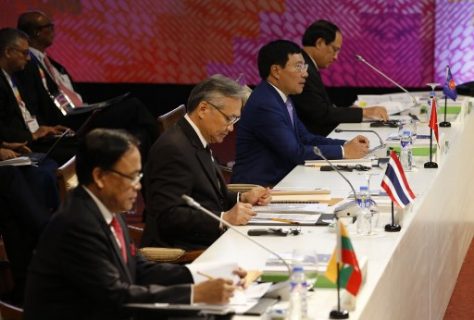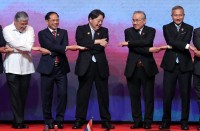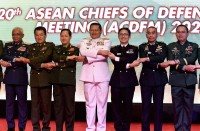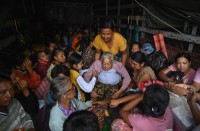
Vietnam urged other Southeast Asian nations to take a stronger stand against Chinese expansionism in the South China Sea, as a tense regional security forum began on August 5 with North Korea also under fire over its nuclear program. / AFP PHOTO / POOL / ERIK DE CASTRO
by Martin Abbugao / Ayee Macaraig
Agence France Presse
MANILA, Philippines (AFP) — Vietnam urged other Southeast Asian nations to take a stronger stand against Chinese expansionism in the South China Sea on Saturday, as a tense regional security forum began with North Korea also under fire over its nuclear program.
Ahead of the launch of the annual gathering of foreign ministers from the 10-member Association of Southeast Asian Nations (ASEAN), Vietnam made a bold play against China with a raft of suggested changes to a planned joint communique.
It set the stage for a fiery few days of diplomacy in the Philippine capital, with the top diplomats from China, the United States, Russia and North Korea to join their ASEAN and other Asia-Pacific counterparts for security talks from Sunday.
The meetings will take place as the United Nations Security Council votes this weekend on a US-drafted resolution to toughen sanctions against North Korea to punish the isolated regime for its missile tests.
The United States said it would also seek to build unified pressure on the North at the Manila event — known as the ASEAN Regional Forum.
After their own day of meetings on Saturday, ASEAN foreign ministers released a joint statement expressing “grave concerns” over the North’s first two intercontinental ballistic missile tests that were conducted last month.
“These developments seriously threaten peace, security and stability in the region and the world,” the statement said.
But on the South China Sea dispute — one of Asia’s other top powder keg issues — there was far less consensus with the Philippines seeking to placate Beijing, and Vietnam leading the resistance, diplomats told AFP.
Vietnam on Friday night sought to insert tough language against China in an ASEAN statement that was scheduled to be released after the Southeast Asian ministers wrapped up their own talks on Saturday.
According to a copy of a draft obtained by AFP, Vietnam lobbied for ASEAN to express serious concern over “construction” in the sea, a reference to China’s ramped up building of artificial islands in the disputed waters in recent years.
Vietnam also wanted ASEAN to insist in the statement that a planned code of conduct for the sea with China be “legally binding”, which Beijing opposes.
Malaysia also pushed for some tougher language, including with a reference to “military assets” in the contested waters, according to the draft and discussions with diplomats involved in the discussions.
– Tense talks –
China claims nearly all of the strategically vital sea, including waters approaching the coasts of Vietnam, the Philippines, Malaysia and Brunei.
China has in recent years expanded its presence in the sea by building the artificial islands, which are capable of holding military bases.
The Philippines used to be the most vocal critic of Beijing’s expansionism.
But, since President Rodrigo Duterte was elected last year, the Philippines has sought to downplay the dispute with China in return for billions of dollars in Chinese investments and aid.
China has in recent years also successfully lobbied other ASEAN nations, particularly Cambodia, to support its diplomatic manoeuvring in the dispute.
The joint statement that was scheduled to be released after the ASEAN ministers was delayed because of the dispute over the wording on the sea issue, one diplomat told AFP.
“There is no consensus yet,” the diplomat said, adding the drafting committee was tasked with continuing the negotiations on Saturday night.
ASEAN is on Sunday set to adopt a framework with China for a code of conduct, which is meant to pave the way for more concrete action.
But security analysts point out that the framework comes 15 years after negotiations on the issue first began, and China has used that time to cement its claims with the artificial islands.
Another pressing issue in Manila will be the growing terrorism threat in the region.
The event is taking place as Philippine security forces battle Islamic State-aligned gunmen who have since May been occupying parts of Marawi, the nation’s main Muslim city about 800 kilometres (500 miles) to the south of Manila.
US Secretary of State Rex Tillerson is also set to meet Duterte on the sidelines of the event, with those talks expected to cover the Philippine president’s controversial drug war that has claimed thousands of lives.







